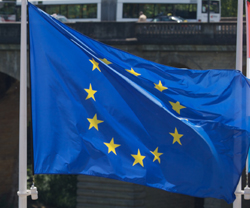Politics
EU Commission wants a transaction tax
 EU Commission President José Manuel Barroso is pushing for a tax on financial transactions. In the European Parliament, he announced at the end of September that “this tax can contribute 55 billion euros a year”. The financial crisis had already cost the EU countries €4600 billion in guarantees. Now it was time for the financial industry to pay back the money. The Commission plans to submit a draft law which aims to apply the tax as from 2014 to the purchase and sale of securities, bonds, equities and derivatives between banks, insurance companies and other financial houses in the 27 EU States - at a rate of 0.1 percent on stock and bond transactions and 0.01 percent on derivatives. The retail business will be exempt. EU Tax Commissioner Algirdas Semeta was convinced that the G20 countries too would recognize the benefits of the tax. Britain strongly opposes the levy, while Germany and France argue in principle for its introduction. With the tax, especially automated business as well as daily trading would lose some appeal.
EU Commission President José Manuel Barroso is pushing for a tax on financial transactions. In the European Parliament, he announced at the end of September that “this tax can contribute 55 billion euros a year”. The financial crisis had already cost the EU countries €4600 billion in guarantees. Now it was time for the financial industry to pay back the money. The Commission plans to submit a draft law which aims to apply the tax as from 2014 to the purchase and sale of securities, bonds, equities and derivatives between banks, insurance companies and other financial houses in the 27 EU States - at a rate of 0.1 percent on stock and bond transactions and 0.01 percent on derivatives. The retail business will be exempt. EU Tax Commissioner Algirdas Semeta was convinced that the G20 countries too would recognize the benefits of the tax. Britain strongly opposes the levy, while Germany and France argue in principle for its introduction. With the tax, especially automated business as well as daily trading would lose some appeal.
Banks should get fit faster
 Nine banks failed the most recent stress test. 16 more just scraped through. While the failures must get money in the financial markets by the end of the year, the bare passes are so far free to increase their equity by April 2012. Now European banking watchdogs are pushing for seven Spanish, two German, two Greek and two Portuguese banks as well as one each from Italy, Slovenia and Cyprus to stock up with fresh capital more quickly. Among the banks is also the HSH Nordbank. While the 16 banks should try to obtain new funds through the financial market first, EU internal-market Commissioner Michel Barnier does not rule it out that some banks may need government assistance. France votes for the €440 billion-euro rescue fund EFSF to act in such cases.
Nine banks failed the most recent stress test. 16 more just scraped through. While the failures must get money in the financial markets by the end of the year, the bare passes are so far free to increase their equity by April 2012. Now European banking watchdogs are pushing for seven Spanish, two German, two Greek and two Portuguese banks as well as one each from Italy, Slovenia and Cyprus to stock up with fresh capital more quickly. Among the banks is also the HSH Nordbank. While the 16 banks should try to obtain new funds through the financial market first, EU internal-market Commissioner Michel Barnier does not rule it out that some banks may need government assistance. France votes for the €440 billion-euro rescue fund EFSF to act in such cases.
Getting a better picture of credit risks
Generally there are two common methods under Basel II by which banks in Europe assess their credit risks. In the standard procedure, which U.S. banks also apply, the credit risks are evaluated by credit-rating agencies. If they find a high probability of default, the banks must deposit more equity. With the internal rating used by most European banks, however, the credit houses assess their default risk themselves. Since this method is strongly criticized from the U.S. side and restricts the comparability of banks’ balance sheets, the Basel Committee wants to provide more transparency. It aims to develop a test procedure that is much stricter than in the past, reports Financial Times Deutschland. Plans are for spot checks to compare banks’ risk processes. The desired comparability of capital and liquidity parameters is crucial for the credibility of the forthcoming Basel II regulations, according to Stefan Walter, Secretary-General of the Basel Committee.
EU considers expropriating bank shareholders
 It was mainly the taxpayers who were asked to pay for the financial crisis. Now EU internal-market Commissioner Michel Barnier wants a draft directive to ensure that in future shareholder and creditor rights in distressed banks may be significantly limited legally. The draft, reports Handelsblatt, goes so far that in the extreme case the shareholders can be expropriated. Barnier further urges that EU countries’ national banking supervisors must have the right to write off or delete stock. A debt cut to the detriment of a bank’s creditors is also provided for. In addition, the management of a damaged bank could be replaced and the institution radically restructured. The draft also states that parts of the balance could be shifted to a bridge bank or business units sold without shareholders’ approval being required. In addition, an insolvency should enable shareholder rights to be overridden, and the remedies available against a governmental reorganization could be significantly restricted. Moreover, all EU countries should require their banks to pay into an emergency fund which would after ten years have accumulated an amount equal to at least 0.6 percent of the savings deposits in the country covered by State deposit insurance. Barnier will officially submit his draft in November. EU takes aim at auditors
It was mainly the taxpayers who were asked to pay for the financial crisis. Now EU internal-market Commissioner Michel Barnier wants a draft directive to ensure that in future shareholder and creditor rights in distressed banks may be significantly limited legally. The draft, reports Handelsblatt, goes so far that in the extreme case the shareholders can be expropriated. Barnier further urges that EU countries’ national banking supervisors must have the right to write off or delete stock. A debt cut to the detriment of a bank’s creditors is also provided for. In addition, the management of a damaged bank could be replaced and the institution radically restructured. The draft also states that parts of the balance could be shifted to a bridge bank or business units sold without shareholders’ approval being required. In addition, an insolvency should enable shareholder rights to be overridden, and the remedies available against a governmental reorganization could be significantly restricted. Moreover, all EU countries should require their banks to pay into an emergency fund which would after ten years have accumulated an amount equal to at least 0.6 percent of the savings deposits in the country covered by State deposit insurance. Barnier will officially submit his draft in November. EU takes aim at auditors
EU internal-market Commissioner Michel Barnier wants to ban auditors from offering consulting services in future. Through the separation of functions he wants to achieve greater independence of auditors. In addition, after nine years at most a company should change its auditor. Large corporations with revenues beyond the billion mark should submit their balance sheets to two companies for examination; moreover, in this joint-audit model one of the two audit companies should not be from the big four - a model already practised in France. Barnier would thus break up the oligopoly on the market. Currently the big four audit companies, PwC, KPMG, Ernst & Young and Deloitte, share about 90 percent of the European market. Mainly from Germany and the CDU and FDP deputies in the European Parliament, but also the audit companies themselves, serious criticism is hailing down on Barnier’s proposed law, which he will bring to the legislature in November.
More transparency in lobbying
Christian Lange, parliamentary secretary of the SPD parliamentary group, is calling for a three-point code of conduct for lobbyists in Germany. A lobby register is to be kept, in which all lobbyists will be entered, with name and type of activity. Information about the client, employees, contractors, funding sources and budgets should also be disclosable, and viewable online. For violations of the transparency obligation, fines up to €200,000 should be possible. In addition, he calls for a Code to bind the registered lobbyists to the principles of openness, transparency, honesty and integrity. Acceptance or refusal of this Code should also be made public in the register of lobbyists. To ensure that the use of consultants in the federal ministries is also transparent and understandable, Lange calls for a “legislative footprint”. A report should show if and when what consultants have made a significant contribution to the drafting of a bill. Lange calls on the administrations generally to show more restraint in the use of external consultants and to distinguish the interests of public-interest associations from profit-oriented actors. Lange’s third requirement is a code of honour for ex-ministers, as already exists in EU circles. Those who change sides, i.e. former ministers working for the lobbying side, should on the one hand keep to a certain transition period and on the other report their new jobs to the federal government.















